
 |
|
| |||||||||||
|
Blood and dust: Guy Pearce and "The Proposition"
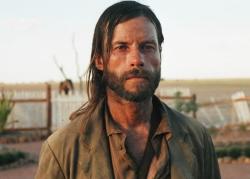 Spoiler warning: While Guy Pearce doesn't divulge any plot twists, the nature of our conversation was such that those who haven't seen the film might want to wait until watching "The Proposition" before reading this interview. DVD Talk: What most struck you about Nick Cave's screenplay; what drew you to this particular story? Guy Pearce: Initially, it was just the script and, I guess, its unconventional nature. I think, with a lot of scripts, you tend to pick up on a formula as you're 20 pages, if not sooner, into it. There was something about Nick's script that just felt quite sort of random and unique, I suppose. (It was) really beautifully written and it was really poignant; it was a great sort of clarity, as far as what it was these folks were going through. It's not just that that I look for in a script, because it can be very clear, but it's not particularly interesting. It seemed really compelling. It's funny, because I think it was probably more the whole piece that drew me to it than specifically just my character; sometimes you're so moved by the character and yet you don't fully get the whole picture. I felt like I was reading a beautiful book, I didn't feel like I was reading a script. There were a number of things that took me outside the usual experience of reading a script, but as I say, it wasn't just those things; it was that, at the heart of it, there were some real people who were going through a rather difficult time. There was a lot of time spent on the emotional turmoil of each character; that's what I find interesting in filmmaking - it's not how much you can jam in, it's not how big it can all get, how spectacular it can all be, it's that lingering on someone's personality or the psychology of each character. So I kind of delved into it just by reading it and then I met John Hillcoat, the director and found him to be perfectly accessible and understanding. So there was really no reason not to do it, just one of those things that kept getting better and better. 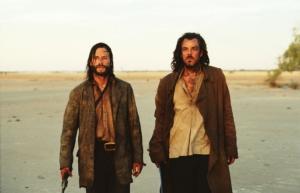 DVD Talk: Did your character's journey surprise you? Pearce: I don't think it surprised me; I don't think, from memory, there were any surprises as such - I was compelled and I was intrigued at how human beings would deal with that situation and also how Ray Winstone's character would deal with the mess he got himself in and how the younger brother would deal with it - how everybody would deal with it. So I don't think I was surprised - it was very honest and the nice thing about the film is that it's pretty much laid out for you in that first scene. There's sort of no room for surprise, that's taken away and it's more about a real - obviously it's called "The Proposition" - there's something that's proposed and you as a character and you as an audience member have to sit in that and think about what you'd do with that and that's what I find interesting. I'm more interested in that generally as an idea than twists and turns and stuff in the film. DVD Talk: What do you feel the film says about the nature of family? Pearce: I guess it's - I think it breaks down some typical notions of family; it means I suppose that family can come in any kind of form. There are so many films and stories that tackle or don't tackle and deal with the notion of good and how good we can be for each other and keeping away from doing bad things, etc. as if sitting in some sort of judgment. If you've got a pack of hyenas that'll go off together and maul other animals in order to survive, then that, in its rawest form, has got to be considered a family. I think there was something very animalistic about this film; it really was like a pack of wild dogs living out in the dust. There, in the middle of it, was this beautiful Emily Watson; it didn't make any difference how luscious and fragile she was, the notion of family through Danny Huston's eyes still remained true. It's just one of those things, it tries to break down the typical idea of family. People say, 'Love goes beyond any boundaries' or whatever and people tend to judge criminals and say 'They don't know how to love' or 'They're outcasts and they don't deserve what we have or what we deserve to have in our lives' and I reckon that's a load of crap. I think you get what you deserve and you deserve what you get and you get what you think you're owed; it doesn't matter what form it comes in. I guess it's the whole idea of what's good and what's bad and it's just really hard to pinpoint that sometimes and I think films think they've pinpointed that really too conveniently and too easily; I think this film threw it all up against a wall - splat! - and went well, it's still family. So I just like the rawness of that. 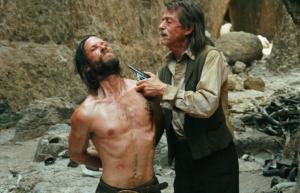 DVD Talk: Were the working conditions brutal? Pearce: It's funny because they were really just informative - I think one of the tricky things, well, for me, and it can be the same for other actors, is that you're always worried about doing what you're doing successfully. And I don't mean it being a big hit and making lots of money, it's knowing what you're doing is believable. And so you tend to think about that shit too much rather than just kind of doing it and I think when you're in that kind of environment, there's no room for thinking anymore - you're just in the heat and there's really only one kind of way to move in that heat and you pretty much realize how that is when you're there. So it's a double-edged sword, as difficult as that kind of heat is, it's also really helpful and it just dictates how things really are. So I kind of loved it, we all loved it, I think; we loved getting dirty and loved getting that hot and sweaty. It was easy enough for us because we were able to clean off at the end of the day and come back to the motel and jump in the pool if we really needed to but the atmosphere and the environment was just so specific it was incredible. I think it's probably harder for the crew - sure, they've also got to imagine that world and get into it and stuff, but they have to lug heavy equipment around and be themselves and operate in that situation. Whereas they have to still do practical things as themselves but we're transforming in a way, what probably becomes difficult for them becomes helpful for us. 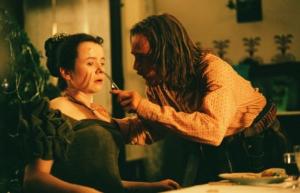 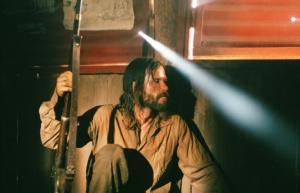 DVD Talk: Do you think this is a film that will find a wider audience on DVD? Pearce: Generally, the response has been great, people have basically said, 'Look, it's a great film' and if there's anything negative they say about it - well, not negative - but that it is really violent, therefore kind of difficult to take in. I personally don't think it's really violent, I think we observe the violence really particularly so it's horrible as violence would be. It's a funny one - I've had a few people say to me, 'Oh, I haven't seen 'The Proposition,' I can't wait to get the DVD and watch it on my little computer.' And I go, 'You reckon you could try and watch it on a big screen?' I really think it needs to have some sort of expanse. But funnily enough, everyone these days has a fairly large TV in their house and my wife and I love to watch DVDs and love to take advantage of the big plasma screen. Of course, the bigger the screen, really the better the effect. On some level, I only know that because - I don't do it anymore, but I used to watch films on the airplane on the tiny little screen and they always seemed like a bad movie to me. I'd think, 'No, that's a good movie, but it seems like a bad one on a tiny screen.' I think it might be something that people take on because they did find when it was at the cinema that the violence might've been too harsh for them but they've now perhaps read some reviews or heard that it actually was a touching film, not just a sort of a boy's violent movie, they might give it a go, hopefully they will. I do feel like it's a really good film, there's no doubt about it. I feel like it's a film that over time, people will catch on. DVD Talk: What do you hope people take away from the film? Pearce: I always find that a tough question, I don't really have any hopes - when I make a film, I do it purely selfishly; I just do it because I feel there's something I can express and it touches something in me. When I'm asked that question, it's sort of a weird one. If I were to think about, for us as people to delve deeper to be able to face questioning ourselves more than what we do. I don't see "The Proposition" just as a piece of entertainment and I don't necessarily do films for that purpose by any means, just as entertainment. I certainly see the value of that; I just don't necessarily think I'm good at that. So I would hope it's something that resonates and I hope people see how ghastly we can be when we're pushed and that might help steer them in another direction. I don't know ultimately what I would hope; just some resonance and makes people question themselves. It somehow cause some sort of change; I like the idea that film can do that, I feel like if we're going to go all this effort ... y'know?
Archives
DVD Talk Interviews Star Wars and Marvel costumer Kelly Cercone
DVD Talk Interviews Director Andrew Bowler Anna and the Apocalypse Cast Interview DVD Talk Interviews Director Chris Weitz Compete Archives
Review Staff
| Newsletter Subscribe
| Join DVD Talk Forum
|
| |||||||||
| |||||||||||